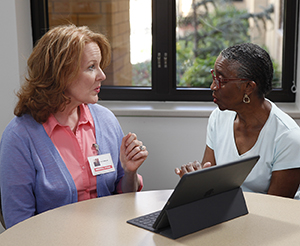Surgery for a Brain Aneurysm: Recovery at Home
An aneurysm may have affected your loved one’s body functions, skills, and emotions. They may move on to a skilled nursing facility or a rehabilitation center. Or they may go home and return for therapy as an outpatient. You, too, can help them recover.
Regaining strength and skills
Depending on the site of an aneurysm, certain abilities may have been affected. This is because each part of the brain controls certain functions, such as language, movement, or eyesight. With special help, many people regain strength and some skills. A physical therapist helps strengthen muscles. An occupational therapist teaches daily skills, such as getting dressed and bathing. A speech therapist helps improve swallowing, as well as speech. Recovery of these functions is often not complete, and recovery occurs at unpredictable rates that vary from days to months. The goal of therapy is to maximize the speed and ultimate potential of the recovery.

Changes in emotions
The aneurysm may have affected your loved one’s emotions. They may be depressed, worried, or mentally tired. These feelings should go away with time. Some people also have trouble controlling their emotions. They have sudden mood shifts. The shifts may be out of context with what is going on. This is called emotional lability. For instance, your loved one may cry after telling a joke or laugh at an inappropriate time. In many cases, emotional lability lessens over time.
How you can help
You can help your loved one in many ways. Make sure they return for all follow-up visits as requested. Talk with the healthcare provider if any sadness or emotional lability does not improve on a weekly basis. If you don't see any improvement in the first weeks, talk with a neuropsychologist, psychologist, or psychiatrist. And check that your loved one takes all medicines as advised.
Be patient with mood swings, pain, or extreme tiredness (fatigue) that your loved one may feel. Also, social work services in the medical center can help coordinate resources to help your loved one and your family with recovery.
Some home strategies that may be helpful include:
-
Create a daily schedule. Include routines for meals, rest times, and therapies.
-
Use reminder strategies to help manage memory problems. These may include:
-
Using a calendar or day timer
-
Setting reminder alarms on cellphones, watches, or other devices
-
Using medicine dispensers
Taking care of yourself
As hard as it may be, it's also important to take care of yourself. Caregiving duties can have a huge impact on your ability to work and make social connections. They can affect your ability to maintain your own physical and emotional health. At the same time, caregiving can also strengthen relationships. And it can provide great physical and emotional satisfaction.
Eating healthy, getting enough rest, and taking breaks are all key to your well-being. They are vital to your ability to care for yourself and your loved one. It's also important to accept help from family and friends. And ask for professional counseling support if you need someone to talk to.
In addition, think about joining a caregiver support group. These groups provide a sense of community. And you can learn about resources and strategies that have helped other caregivers and their families. Ask your provider for a list of local support groups.
When to call the healthcare provider
Call the surgeon right away if you notice any of these in your loved one:
-
Uncontrolled movements or a seizure
-
A severe headache
-
Any loss of function
-
A high or long-lasting fever
-
Fluid leaking, redness, or pain at the incision site
-
Fainting or falling. Either of these may signal changes in brain function.
-
Pain in leg or swelling
-
Ongoing nausea or vomiting
-
Burning feeling when peeing
-
Major change in ongoing behaviors
-
New behaviors that concern you, such as agitation or aggression
Your loved one may have to take a few medicines to control pain, blood pressure, and other problems. It’s very important that all medicines be taken as directed. Medicines work best if they are taken on time.
Never stop a medicine or change a dose without talking to your loved one's healthcare provider.